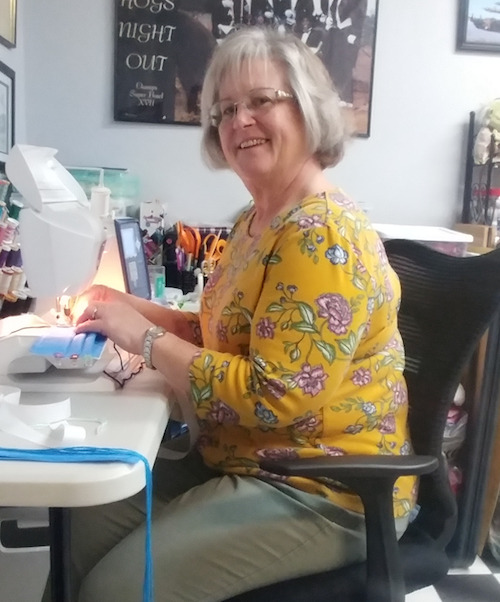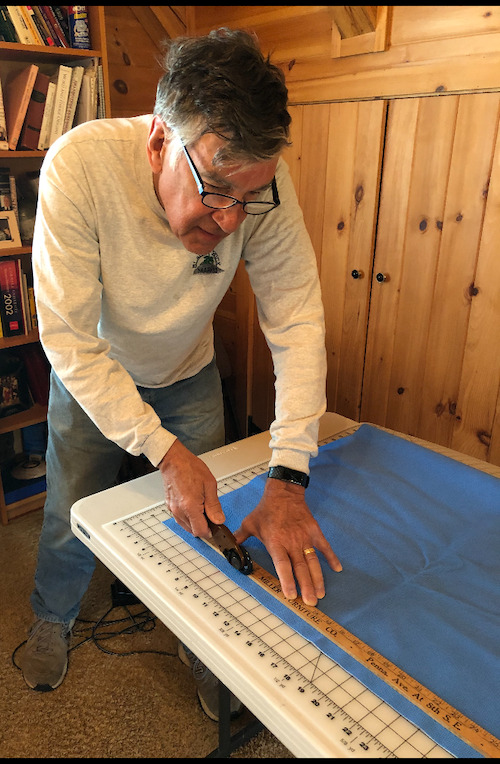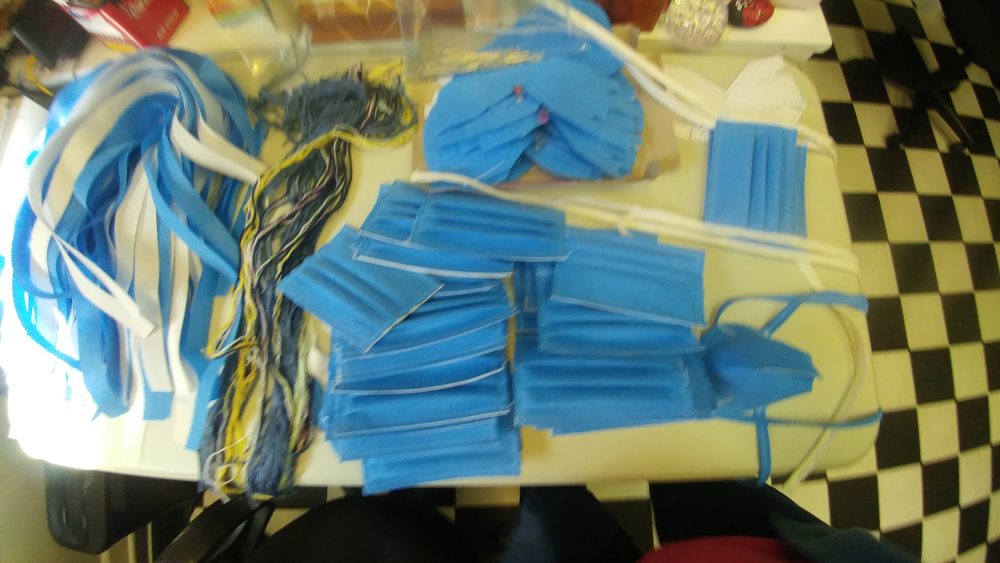Waynesboro parish sewing ministry makes more than 2,100 masks
When news of the coronavirus outbreak first began to spread, the members of the sewing ministry at St. John the Evangelist, Waynesboro, began stitching cotton face masks as a way to put their faith into action.
Parishioner Judy Charles formed the sewing ministry about five years ago and until recently its 12 members were known for making exquisite vestments, baptismal garments, altar cloths, banners and anything the church needed. They also made baby clothes for new mothers and quilts for the elderly in the area.
But when Charles learned in mid-March of the need for simple cotton masks for everyday use, she suggested the group begin making them for the local medical community.

made during the COVID-19 pandemic. (Photo/Stewart Fannin)
“Everyone agreed, because they all want to help,” Charles said. “This is what we do.”
The cotton masks, notable for their expert quality, quickly became popular. Soon Charles was asked by the nearby Augusta Health Medical Center if she and her sewing group could make medical masks from surgical drape fabric.
Tami Radecke, vice president of Community Partnerships at Augusta Health and executive director of Augusta Health Foundation, spoke with several nurses who wondered if Charles and her skilled friends could use sheets of surgical drape fabric — the sanitary, synthetic material used to cover not only sterile instruments but also patients and medical staff during surgery — to make professional-quality medical masks similar to the well-known and increasingly hard-to-find N95 masks.
“We had extra boxes of blue surgical drape fabric, and we got the patterns for them to use,” explained Radecke.
Besides the pattern for the fitted, cone-shaped mask, the sewing group could use a pleated pattern with the surgical drape also.
So she asked Charles, who said yes. As of this writing, the St. John sewing ministry has made more than 1,300 masks out of the surgical drape fabric, as well as more than 800 cotton masks, for Augusta Health. Charles said the surgical drape masks block 99.9 percent of the virus.
One more bonus, Radecke noted, is that although the papery surgical drape fabric is designed to be disposable, the masks made from it can be sterilized in a medical autoclave chamber and reused.
Augusta Health registered nurse Tracy Sansossion, an Infection Control Practitioner, wrote to Radecke via email: “These seamstresses are heroes. My goodness: those surgical drape masks. Wow! I cannot even comprehend the time and love put into each and every one. I am amazed and extremely humbled and honored by these gifts.”
And, Radecke added, while the surgical drape masks are used by medical staff and caregivers around infected patients, the cotton masks — sometimes made with fun, colorful prints — are still valuable for others, such as cancer and hospice patients. They are also used for other staff members who do not interact with patients but who must remain in medical facilities.

ministry and others. Together, they have made more than 2,100 masks during the COVID-19 pandemic. (Photo/Candy Kropp)
“This group at St. John’s has done so much to help our medical personnel and the whole community,” said Radecke, who is also married to a retired Lutheran minister. “And as a person of faith, I see this as the Church body, as a whole, working together. We are all in this together.”
Parishioner and seamstress Mary Fannin said that making the masks — she has made more than 300 so far — became her Lenten project. She uses her sewing time in isolation to contemplate.
“I’m always thinking, ‘Who’s going to wear this mask?’” she said, noting it takes about 15-20 minutes to make a mask, depending on the style.
Charles noted that the sewing ministry has suddenly grown in a burst of support. More than 40 people have stepped up to help, whether they have a lot of sewing experience or just a little — or even none at all.
“Somebody might say, ‘I want to help but I can’t sew,’ and I say, ‘OK, you can cut fabric or trace a stencil,’” Charles said.
Several members’ husbands also have been recruited to cut the heavy wire that goes into each fitted surgical drape mask. Others have supported the ministry with donations of money or supplies.
“Some women have been digging through their sewing kits and bringing us elastic and spools of thread,” Charles said.
Likewise, the sewing ministry has donated more than 100 yards of its own cotton fabric to mask-sewing groups in Richmond and Staunton.
For the fitted surgical drape masks, both Lowe’s stores in Waynesboro and Staunton and Home Depot in Waynesboro have donated wire as well.
Many of the members are around Charles’ age (67) and Fannin’s age (69) but some are older and some are younger. Parishioner Dolores Wheat, 91, has made more than 40 cotton masks at the retirement community where she lives. Teens have joined the effort. And Charles’ own grandchildren, one as young as 6, have helped as well.
“The heroes are among us; they’re not always up on pedestals with candles,” said Fr. Rolo Castillo, pastor of St. John, about the sewing ministry. “Many times it’s the people in the background of the Church community that actually make up the backbone.”
“I love my Church family,” Charles said. “They want to help because of their faith.”

